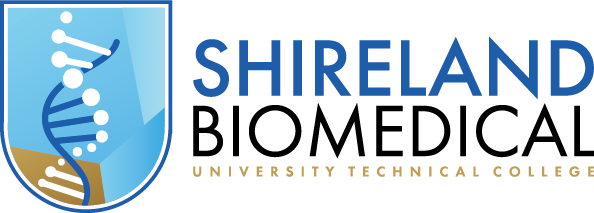BCU Sixth Form Pathways
Joining a childcare sixth form pathway is your first step toward to a rewarding and impactful career. This programme, delivered in partnership with Birmingham City University, offers hands-on experience, expert guidance and in-depth knowledge about child development, education and care. You’ll gain valuable skills that not only prepare you for roles in nurseries, schools and childcare centres but also provide a strong foundation for university studies in teaching, social work or psychology. Plus, you’ll be making a real difference in the lives of young children while preparing for a career that is always in demand. If you’re ready to turn your passion into a profession, the childcare pathway is the perfect choice for you!
As a Shireland Biomedical UTC student you will have:
- Priority access to multiple work experience placements and job opportunities within Shireland Collegiate Academy Trust, including seven early years providers.
- Opportunities to complete the Emergency First Aid at Work qualification with The Royal Wolverhampton NHS Trust.
- Support in submitting applications for the BCU scholarship programme.
- Guest speakers and career talks from various universities and employers within the early years industry.
- Visits to venues such as the Black Country Living Museum for a Victorian classroom experience – comparing today’s schools to the past.
- Guaranteed interviews at Birmingham City University.
Students on this pathway will study an AAQ in Early Childhood Development (Extended Certificate) alongside two other qualifications chosen from a list of options. An AAQ Extended Certificate is the equivalent of one A level.
Compulsory subjects
AAQ Early Childhood Development (Extended Certificate)
Course Overview:
- Accredited by Pearson Education
- Qualification gained will be Level 3 Alternative Academic Qualification BTEC National in Childhood Development (Extended Certificate)
- Assessment will be via exam and coursework
- The course is modular so some assessments will take place in the first year and count towards your final grade
- Students will develop knowledge and understanding of children’s development, importance of play and learning in development, and health and safeguarding practices
- Students will develop knowledge and understanding of how research findings influence legislation, policy and provisions for children
- Skills to support the safeguarding and maintenance of children’s safety, including in emergencies
- Skills to support children’s play and learning experiences.
Course Content:
The qualification has four mandatory units covering the following topics:
- Children’s development – Children’s developmental progress from birth up to eight years, including the theories, principles and factors relating to development, and the potential impact of a range of factors on a child’s progress through the developmental milestones.
- Keeping Children Safe – Health and safety and safeguarding responsibilities of an individual working in an early years setting; emergency best practices and when to address concerns about a child’s welfare.
- Play and Learning – The concept of play, the influence of theories and approaches to play, and the benefits of play and learning activities for children.
- Research and Reflective Practice – The influence of research findings on policy and provision for children and how this influences the behaviours and expectations of an individual working in an early years setting.
| Unit Number | Unit Title | GLH (360) | How it is assessed |
|---|---|---|---|
| M1 | Children’s Development | 90 | External |
| M2 | Keeping Children Safe | 90 | External |
| M3 | Play and Learning | 90 | Internal |
| M4 | Research and Reflective Practice in an Early Childhood Setting | 90 | Internal |
What is AAQ?
AAQ is a Level 3 Alternative Academic Qualification and provides a BTEC National in the course choice. It is accredited by Pearson Education; it is the equivalent of one A level. Assessment is via exam and coursework
Optional subjects
You will also need to choose 2 additional qualifications from this list:
- Maths (requires GCSE grade 6)
- Biology (requires GCSE grade 6)
- Chemistry (requires GCSE grade 6)
- Physics (requires GCSE grade 6)
- Health and Social Care
- Sociology
- Psychology
- History
- English
- Art
- Drama
- Music
- Sound Engineering
- Computer Science

